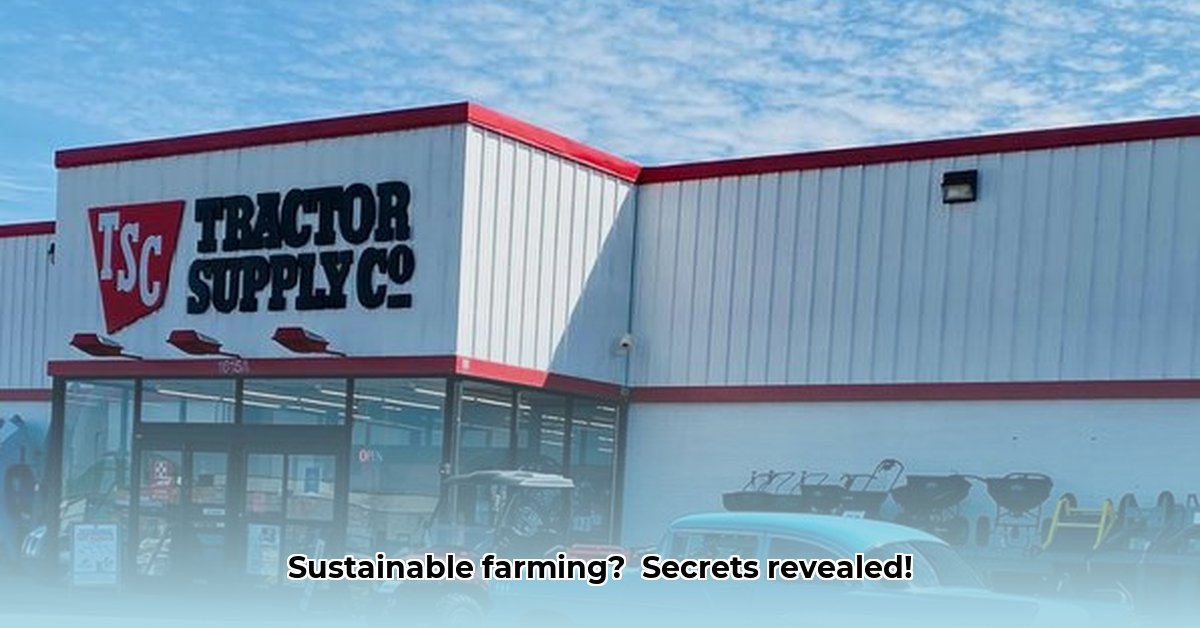
Understanding Tractor Supply's Role in Sustainable Agriculture
Tractor Supply (TSC) in Cleburne serves as a crucial resource for local farmers and gardeners. While not explicitly focused on sustainability marketing, the store's extensive product catalog offers numerous tools and supplies that support environmentally conscious agricultural practices. This guide explores how to leverage TSC's resources to create a more sustainable farm or garden. How can a seemingly average trip to the local TSC contribute to a greener future? Let's find out. For larger-scale operations, learn tractor row creation techniques.
What You'll Find at Tractor Supply in Cleburne: A Sustainable Shopping List
TSC in Cleburne stocks a wide variety of products relevant to sustainable farming. The store's broad inventory, ranging from livestock feed to gardening tools, presents both opportunities and challenges for the eco-conscious shopper.
Products Supporting Sustainable Practices
Water Conservation: Drip irrigation systems, rain barrels, and soil moisture meters—all readily available, enabling farmers to optimize water usage and reduce waste, especially crucial during droughts.
Soil Health: A selection of soil amendments such as compost, cover crop seeds, and organic fertilizers are available to enhance soil structure, fertility, and water retention. These are key to long-term soil health and productivity.
Integrated Pest Management (IPM): TSC frequently stocks natural pest control options, including beneficial insects and organic pesticides, enabling less environmentally-damaging pest management strategies.
Sustainable Livestock Practices: Products for improved livestock feed efficiency and waste management contribute to reduced environmental impact.
Navigating the Sustainability Maze: Making Informed Choices at TSC
While TSC doesn't explicitly label all eco-friendly products, consumers can take proactive steps to make sustainable choices:
Prioritize Local & Organic: Whenever possible, opt for products from local suppliers and choose organic alternatives for fertilizers, pest control, and seeds. This reduces transportation emissions and the use of harmful chemicals.
Minimize Packaging: Select products with minimal packaging or easily recyclable containers to reduce landfill waste. Small changes add up to a significant impact!
Invest in Durability: While initially more expensive, high-quality tools and equipment last longer, reducing replacements and overall waste. This approach is a sustainable investment in both efficiency and environmental protection. Consider this a long-term strategy for cost savings and sustainability.
Research Before You Buy: Investigate brands and products online; look for certifications and commitment to sustainability. A little research can go a long way.
Communicate Your Priorities: Share your focus on sustainable options with TSC staff. Your feedback can inform their purchasing decisions and encourage improvements. Your voice matters!
Explore Alternatives: Look for recycled materials and less toxic pest control and fertilizer options. There are often environmentally-friendlier alternatives available.
Transparency and the Future of Sustainable Agriculture at TSC
The lack of widespread, readily-available sustainability labeling on products at TSC presents a challenge. However, that challenge presents an opportunity for consumers to proactively shape the store’s offerings. By choosing sustainable products and communicating their preferences, shoppers can encourage TSC to increase transparency and offer more eco-friendly options. This collaborative approach is vital for creating a more sustainable agricultural future.
Key Takeaways: Your Role in Sustainable Farming
- TSC's indirect contribution: The store provides access to essential tools for sustainable farming, even if sustainability isn't explicitly advertised.
- Consumer empowerment: Informed purchasing decisions at TSC are crucial for fostering sustainable agriculture in Cleburne.
- Collaboration for change: A collective effort from TSC, farmers, and consumers is required to build a more environmentally responsible farming community.
- Ongoing improvement needed: While TSC offers many sustainable options, more explicit sustainability initiatives from the company would further amplify their positive impact.